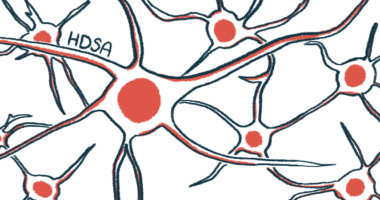Calcium channel blockers may speed Huntington’s in those at risk
Earlier age at onset seen in gene target study of drug to control blood pressure

Huntington’s disease could develop at earlier ages in people using calcium channel blockers to control hypertension, a study that looked into genes encoding targets of blood pressure-lowering medications reported.
Findings may have important implications for managing high blood pressure in people at risk of Huntington’s, identified before disease symptoms are evident, its researchers wrote. But they also noted the importance of addressing hypertension, a known cause of cardiovascular disease.
The study, “Hypertension, antihypertensive drugs, and age at onset of Huntington’s disease,” was published in the Orphanet Journal of Rare Diseases.
Firmer link between age at Huntington’s onset and blood pressure needed
A genetic neurodegenerative disease, Huntington’s usually manifests in adults ages 30 to 50, but it can occur at any age.
Knowing its risk factors can help to identify people at a higher risk of Huntington’s before symptoms manifest, allowing earlier intervention.
Previous research into a potential link between blood pressure and age at Huntington’s onset has had inconsistent results. Some studies report a later disease onset with hypertension, while others suggest that use of antihypertensive therapies can delay onset.
To clarify this, researchers in China turned to Mendelian randomization, a method that uses genetic information to find if a cause-and-effect exist between an exposure (in this case, blood pressure) and an outcome (age at Huntington’s onset).
They drew on publicly available pooled genetic data covering 757,601 people in Europe from the International Consortium of Blood Pressure and the U.K. Biobank.
They specifically looked for gene variations associated with blood pressure and blood pressure-lowering variants in genes that are known targets of antihypertensive medications — used as proxies for the effects of these treatments.
The presence of these gene variants and age at Huntington’s onset then was examined in patients: 4,647 women and 4,417 men of European ancestry who participated in a large study, the Genetic Modifiers of Huntington’s Disease Consortium.
Researchers first looked for a potential association between genetically determined blood pressure and age at disease onset.
Higher blood pressure, predicted by target genes, tied to later onset
Results showed that a genetically predicted higher systolic blood pressure (SBP) or diastolic blood pressure (DBP) was linked to a significantly later disease start. SBO measures the pressure in arteries when the heart beats, while DBP measures the pressure in arteries when the heart rests between beats.
However, no significant link between blood pressure and onset age was found when SBP or DBP were considered as potentially influencing factors.
Next, the team looked at genetic proxies of the effects of three types of common antihypertensive medications: angiotensin-converting enzyme inhibitors, beta-blockers, and calcium channel blockers.
They found that a SBP reduction of 10 millimeters of mercury via blood pressure-lowering variants in genes targeted by calcium channel blockers significantly associated with an earlier age at Huntington’s onset.
No cause-and-effect link was seen between variants in genes coding for targets of the other two antihypertensive medications and disease onset.
“We provided evidence that hypertension might delay the onset of HD [Huntington’s disease], and the use of antihypertensive medications might be associated with an earlier age at onset of HD using genetic data for the first time,” the researchers wrote.
Calcium channel blockers, they added, “may not be a promising strategy for delaying HD onset,” as previously thought.
However, Mendelian randomization looks at the effects of a life-time exposure, whereas antihypertensive treatments are used “for much shorter periods, and blood pressure may have age-dependent effects,” the researchers noted.
For people at Huntington’s risk with hypertension, “the probability of cardiovascular and cerebrovascular diseases [also] should be taken into account.”
Further research “into the effect of [blood pressure] and antihypertensive drugs on [age at Huntington’s onset] is recommended, especially randomized controlled trials, and to explore how the effects vary with age,” they concluded.
Among study limitations was its reliance on data from people of European ancestry, so findings “might be difficult to extrapolate … to other ethnic groups,” the researchers noted.







